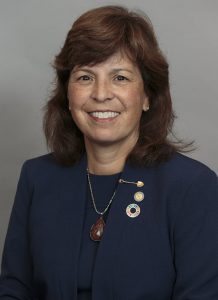From the President: Preparing for Tomorrow’s Workforce Challenges
Working in the water sector, I am constantly learning and being challenged by the people around me. Ours is a profession that, at its core, requires working with others to find solutions that make sense for the future. I love the spirit of cooperativeness that you can find so often behind the fence of a water resource recovery facility (WRRF).
At the same time, we know that the challenges of tomorrow demand much more preparation from us today. Most of that preparation — like all important things — comes down to having the right number of the right people in place to do the work needed. For us, this translates to preserving and expanding our close-knit, talent-rich workforce. It means encouraging and developing new skills in those already here as well as seeking out new people and perspectives.
Change Brings Opportunity
By now, you’ve heard the terms silver tsunami or brain drain to refer to the looming water sector skills shortage expected as the older generation of water sector staff retire. It is critical that we focus on recruiting people into our workforce and retaining them to fill — and update — the roles of those who are retiring.

The silver tsunami is an opportunity to train a workforce with in-demand skills that the sector has not traditionally regarded as important. In the past, as long as people could brush their teeth and flush their toilets, customers were content to have their water utility out of sight and out of mind. We were humble heroes working in the background.
Today, however, infrastructure needs, adequate sanitation, and protection of public health require awareness of the resources needed to provide these services. The means the water workforce is expanding and changing. Consider what has happened in recent years with green infrastructure, smart technology, and resource recovery. The water sector is fully integrating with other sectors to provide for a healthier global environment.
WEF is helping to lead this move from the background to center stage. In December, I had the honor to attend the premiere of the documentary, “Brave Blue World.” WEF is the key sponsor for this inspiring and positive documentary. It explores how the water sector is changing and confirms the importance of finding new solutions for today’s and tomorrow’s water challenges. The idea of preparing the water workforce to navigate these new challenges and opportunities is both exciting and daunting.
Casting a Wider Net
As our WRRFs implement new, more efficient processes and tools, we must shift how we approach our work to identify the skills needed to keep us adaptable. This transformation requires nimble and adaptable people at every level.
The Water Environment Federation (WEF; Alexandria, Va.) supports that ideal through our Strategic Plan, which includes a goal to “Promote sector-wide action toward development of a water workforce that is diverse and prepared to meet the future needs of the water sector.”
To support this goal, in early October the Board of Trustees appointed a Diversity and Inclusion (D&I) Task Force charged with providing recommendations on where the organization should best focus our external efforts related to the development of a more diverse water workforce. This task force is well on its way to completing research on available resources. The Board looks forward to their findings and recommendations this year.
It’s critical that we welcome and embrace people with diverse backgrounds, perspectives, and experiences as we encourage people in our communities to consider careers in the water sector. Employing and training people in our communities to work in the water sector provides economic benefits, facilitates understanding and awareness of how to provide water needs to our communities, and enables a clear path for sustainable operations.
One notable example of how WEF is achieving these goals is our highly successful InFLOW program at WEFTEC®. We piloted this program in 2018 to bring students from historically black colleges and universities to WEFTEC. At WEFTEC 2019, we increased the number of schools to six and hosted more than 40 students. The diversity of the students also increased with Latinxs, native Hawaiians, and native Alaskans participating. WEF is now working to replicate this program at the Member Association level.
We also recently updated our Work for Water website, developed in partnership with the American Water Works Association (Denver, Colo.), to provide more information about career opportunities in the water sector.
Advocating for Operators
Earlier, I used the term “humble heroes” to describe our operators. It’s worth repeating. These folks serve as our front-line defenders during floods, hurricanes, and all types of severe weather. On top of that, they constantly adapt to new technologies, processes, and contaminants. They are key to the resilient operations that our communities demand.
The need for well-trained operators is a worldwide issue. Sustainable Development Goal 6, set by the United Nations, is to “Ensure Availability and Sustainable Management of Water and Sanitation for All,” and achieving this goal requires well-trained operators. WEF recently issued a position statement affirming support of this goal and the water professionals who work to achieve it.
In 2020, WEF will continue to support operators through our Operator Advisory Panel, a think-tank for guiding operator initiatives. The panel’s work includes a translation strategy for in-demand operator training materials, furthering advocacy for the water workforce and, moving the needle on WEF’s strategic goal to “Lead the development and adoption of national standards for operator certification.”
In the end, it’s all about the people. It’s all about you. We cannot innovate, advocate, or create without people. We need you, and we are working for you.
We all also need new people. So, share your stories. Your dedication, passion, and talent are inspiring and will lead the people we need to join us working in water.
─ Jackie Jarrell, 2019-2020 WEF President
